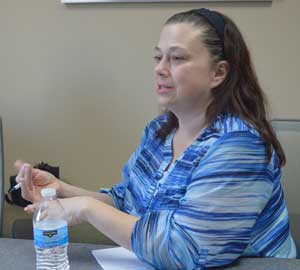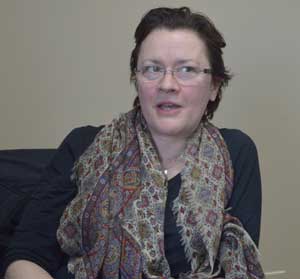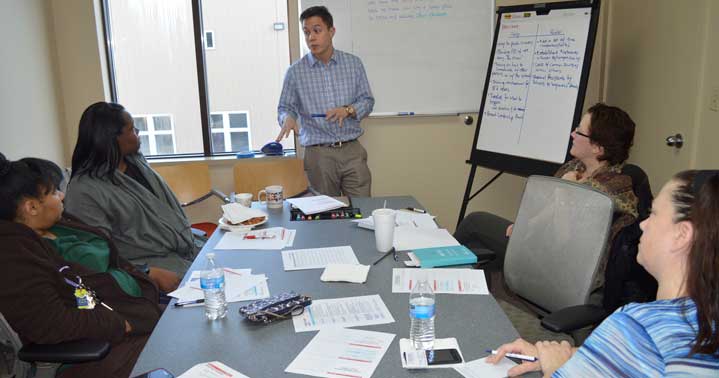As a mother with three children in public schools, Barbara McFall wants to support her children’s educational experience. But sometimes she senses a wall between the school system and parents, and a less than welcoming attitude in some schools.
That’s one reason she is active in Parent Leadership Network, a new organization that aims to empower parents by giving them more of a voice in their children’s schools. Facilitated by the Grand Rapids Urban League, the PLN has attracted parents from several Kent County school districts including Grand Rapids Public Schools, Forest Hills, Grandville and Kentwood, as well as Christian and charter schools.
|
Calling All Parents! Ideas for Action
Source: Grand Rapids Urban League |
Since meetings began last August, the PLN has tapped into a nerve of parent frustration at not being fully heard or more involved in school decision-making, said the Urban League’s Kyle Lim. It appeared to be a need not met by most traditional parent-teacher groups, said Lim, project coordinator of the Center for Education Innovation and Youth Development.
“There are great parent groups, but those are supporting individual schools, and there’s not a lot of autonomy there,” said Lim, noting PTOs typically support fundraising and what schools are already doing. “There wasn’t this outside voice telling schools, ‘These are things we need and want for our children.’”
For McFall, it’s an avenue to advocate for all students, not just her children at Shawmut Hills Elementary, Union High School and Innovation Central.
“My ultimate goal is to help repair things now for the younger children or the future generations,” she said. “Because if something doesn’t get done at this point, if we don’t intervene, who will and when will they?”
Parents Know Their Children
McFall attended a meeting earlier this spring at the Urban League’s offices in Southeast Grand Rapids. It was a light turnout of four parents, among a core group of about 15 actively involved. Three dozen parents have attended one meeting or more.
The group hopes to grow and welcomes more parents from area school districts to attend its meetings, including one on Tuesday, May 31 (see box). Over the course of seven meetings since August – including an official community launch in December – the PLN has increasingly gained focus from a web of parent concerns. It aims to translate those into action steps while respecting parents’ time limits.
“We realize parents have a ton on their plate,” Lim said. “The workload has to be fairly minimal. If they can just be harnessed to make good decisions, we can support (them) in that work.”
The effort evolved from the Urban League’s Opportunity Line, an advocacy hotline for parent concerns about their children’s schooling, such as a need for tutoring or being picked on because of their race. Officials began to hear a lot of common complaints pointing to an overarching need, Lim said: “a space for this autonomous parent voice to be able to say ‘This is what we want for our children.’”
The hotline revealed much frustration around certain issues. Many parents felt their voice was not being represented in school decision-making, and saw a need for more “cultural competency” among teachers to deal equitably with students of different races, ethnicities and income levels.
For the Urban League, a big takeaway was the wisdom parents have to offer, Lim added. “Parents know what their kids really need. Given the chance they are able to come up with great solutions.”

From Common Concerns to Empowering Group
At an April meeting, Lim led parents in brainstorming strategies to create more structure around ideas from previous sessions. Munching on pizza, they discussed what would help and hinder that goal, and what people and resources they could bring into the mix.
Besides McFall, they were Ruth Stein, a Parent Action Leader at Coit Creative Arts Academy; Amanda Spencer, mother of a student at Coit and two others at River City Scholars, a National Heritage Academies charter school; and Linda Moore, PTO president at River City Scholars, whose older children attended GRPS schools.
Working through the action items, common concerns and frustrations emerged. Among them: schools’ resistance to change; staff too overwhelmed with testing and other requirements to be open to parents’ ideas; lack of communication and transparency; and, sometimes, not feeling welcome to participate.
“PTOs and PTAs have a reputation,” said Stein, who has been active at Coit. “A lot of people feel they don’t fit or are not welcome in those organizations.”

She and others also felt some teachers have higher expectations for their own children, who may attend other school districts, than they do for other parents’ children.
“A teacher will say, ‘I want your child to be great,’ but they’re not giving him the ability to be great,” said Amanda Spencer, who has a son with autism. She said PLN has helped her to more effectively communicate her concerns “as opposed to just another parent.”
Linda Moore said the group makes her a stronger advocate for her son with attention-deficit disorder.
“Being in this group is teaching me how to stand up for my son, and be like ‘I really need to fight for my son, because if I don’t nobody else is going to fight for him.’”
Lim said such idea-sharing empowers parents with knowledge and support.
“When we fight these individual battles all the time, it’s exhausting,” he told the group. “That’s one of the reasons why we said, ‘We need to bring people together.’”
CONNECT










